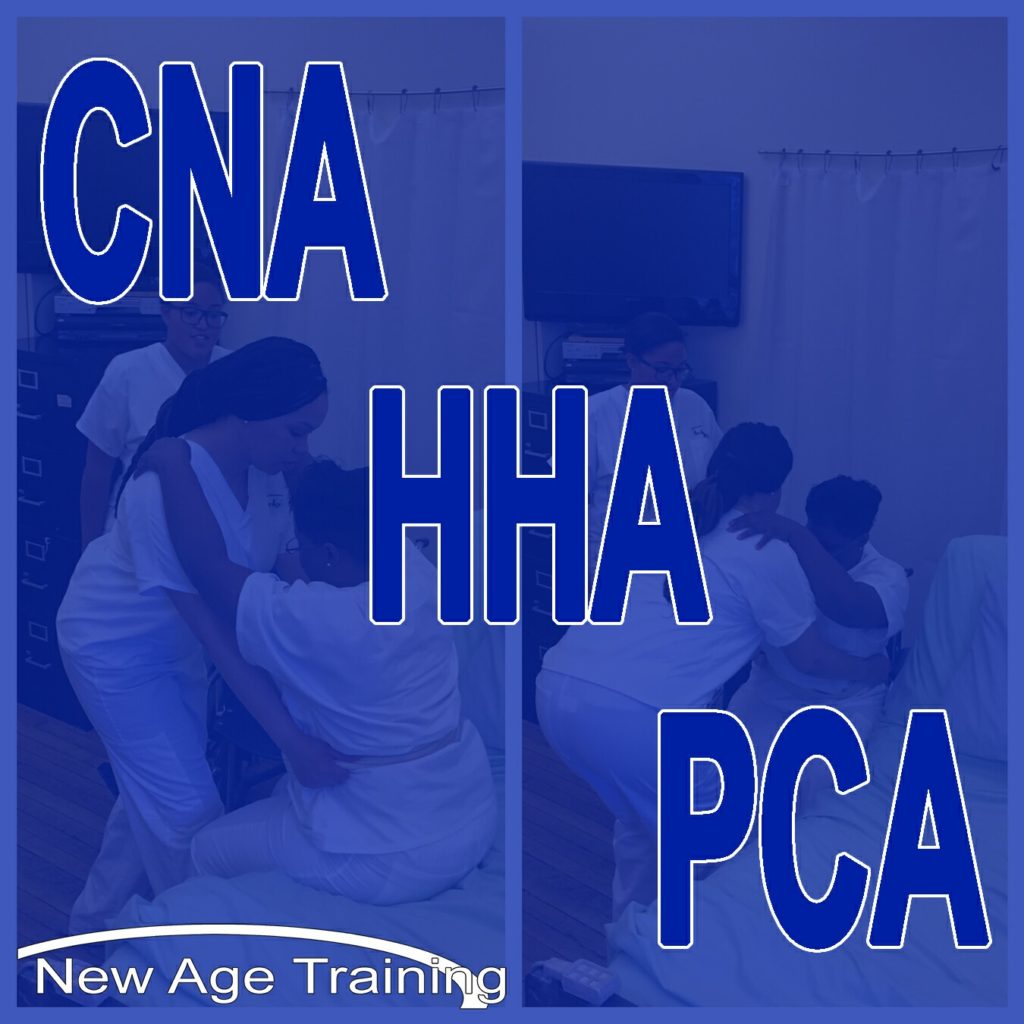
There are several differences between a Certified Nurse Aide (CNA), Home Health Aide (HHA) and Personal Care Aide (PCA), but the main differences are the level of training and the level of medical care they are authorized to provide.Below is a table that will compare and contrast the Training, Certification Requirements, Job Responsibilities, Where They Work and Salary of each of these occupations.
The scope of these positions as well as some of the requirements to become a certified or licensed caregiver varies depending on your state. New Age Training is located in mid-town Manhattan (NYC), so this information is specific to New York.
Besides requiring direct contact with patients to provide basic care, here are some similarities between a CNA, HHA and PCA
- No prior experience required
- Must be able to pass a background check and drug screen
- Compassionate, patient, and able to deal with the bodily functions and blood of patients
- Assist patients/residents with activities of daily living (ADLs): Basic daily quality-of-life needs of patients which includes bathing, feeding, changing bandages and dressings and exercising.
- High School (HS) Diploma or General Equivalency Diploma (GED) is not required, but if you wish to earn $19 or more as a CNA, it will be wise to take the TASC (GED) exam at a High School Equivalency (HSE) test center.
If you are interested in becoming a CNA, please contact us today or come in for a tour and an Information Session with no obligation to enroll.
Please click here to get more information about our CNA program
Please click here to register on-line.
| Personal Care Aide (PCA) | Home Health Aide (HHA) | Certified Nurse Aide/ Assistant (CNA) | |
| Training | Vocational schools | Vocational schools and Community colleges. More specialized training than personal aides (PCA) | CNAs must complete a state-approved training at Vocational schools like New Age Training. This training is more specialized than Personal Care Aides (PCA) & Home Health Aide (HHA) |
| License/Certification Requirements | No License Required.
The Training Provider issues the Home Health Aide Certificate upon successful completion of the program |
No License Required.
The Training Provider issues the Home Health Aide Certificate upon successful completion of the program. |
NYS Certification/License is Required to work.
The person has to pass the NYS Certification Exam, organized by Prometric. https://www.prometric.com/ |
| Job Responsibilities | Bathing, Skin Care Grooming, Toileting, Walking, Transferring, shopping, homemaking and running errands | Physical care: activities of daily living such as bathing, dressing, and toileting, Walking, Transferring, simple dressings. | Basic Nursing and personal care skills, Ambulation, Positioning, Transferring, measuring vital signs, making beds, serving meals, setting up medical equipment, observing changes in the condition of the patient, etc. |
| Related Medical Tasks | No | No. May assist with some medical procedures. All medical-related tasks have to be performed under the supervision of a Registered Nurse (RN) or Nurse Practitioner (NP) | Yes. Tasks include taking vital signs, changing dressings, cleaning catheters, controlling infections, and administering treatments. All medical-related tasks have to be performed under the supervision of a Registered Nurse (RN) or Nurse Practitioner (NP) |
| Where They Work | Private homes | Private homes, retirement communities, assisted living facilities, group homes, or other transitional housing works. | Homes, Hospitals, Rehabilitation Hospitals, Daycare Centers, and skilled Nursing Homes and Long-Term Care facilities. |
| Salary | $15/hr or more | Higher earning potential than a PCA | Higher earning potential than an HHA. Up to $19/hr or more with experience. |
